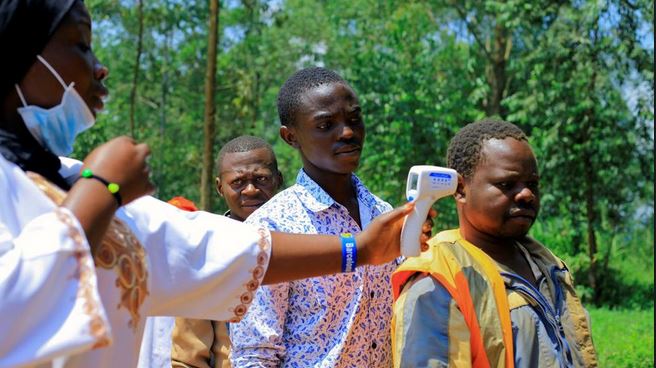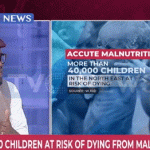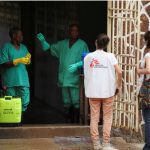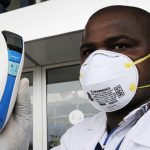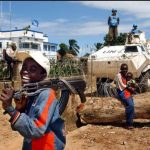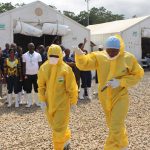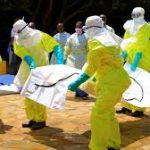Children in eastern Democratic Republic of Congo are dying from Ebola at an unprecedented rate due largely to poor sanitary practices at clinics run by traditional healers, the health ministry said on Sunday.
The impact on children has been felt acutely in the city of Beni, which has emerged as the outbreak’s new epicentre. Of 120 confirmed Ebola cases in Beni, at least 30 are under 10-years-old, and 27 of them have died, according to health ministry data.
Many children affected by an unrelated malaria outbreak near Beni are thought to have contracted Ebola at clinics run by traditional healers who have also treated Ebola patients, said Jessica Ilunga, a spokeswoman for the health ministry.
The rate of new cases in eastern Congo has accelerated in recent weeks. An emergency World Health Organization committee said earlier this month that the outbreak was likely to worsen significantly unless the response was stepped up.
The health ministry reported nine new confirmed cases late on Saturday — seven in Beni and two in the city of Butembo — the biggest one-day day jump since the outbreak was declared on Aug. 1.
The haemorrhagic fever is believed to have killed 168 people and infected another 98 in North Kivu and Ituri provinces, where attacks by armed groups and community resistance to health officials have complicated the response.
Congo has suffered 10 Ebola outbreaks since the virus was discovered near its eponymous Ebola River in 1976. The current one now ranks third in terms of number of confirmed cases.
Children in eastern Democratic Republic of Congo are dying from Ebola at an unprecedented rate due largely to poor sanitary practices at clinics run by traditional healers, the health ministry said on Sunday.
The impact on children has been felt acutely in the city of Beni, which has emerged as the outbreak’s new epicentre. Of 120 confirmed Ebola cases in Beni, at least 30 are under 10-years-old, and 27 of them have died, according to health ministry data.
Many children affected by an unrelated malaria outbreak near Beni are thought to have contracted Ebola at clinics run by traditional healers who have also treated Ebola patients, said Jessica Ilunga, a spokeswoman for the health ministry.
The rate of new cases in eastern Congo has accelerated in recent weeks. An emergency World Health Organization committee said earlier this month that the outbreak was likely to worsen significantly unless the response was stepped up.
The health ministry reported nine new confirmed cases late on Saturday — seven in Beni and two in the city of Butembo — the biggest one-day day jump since the outbreak was declared on Aug. 1.
The haemorrhagic fever is believed to have killed 168 people and infected another 98 in North Kivu and Ituri provinces, where attacks by armed groups and community resistance to health officials have complicated the response.
Congo has suffered 10 Ebola outbreaks since the virus was discovered near its eponymous Ebola River in 1976. The current one now ranks third in terms of number of confirmed cases.
Children in eastern Democratic Republic of Congo are dying from Ebola at an unprecedented rate due largely to poor sanitary practices at clinics run by traditional healers, the health ministry said on Sunday.
The impact on children has been felt acutely in the city of Beni, which has emerged as the outbreak’s new epicentre. Of 120 confirmed Ebola cases in Beni, at least 30 are under 10-years-old, and 27 of them have died, according to health ministry data.
Many children affected by an unrelated malaria outbreak near Beni are thought to have contracted Ebola at clinics run by traditional healers who have also treated Ebola patients, said Jessica Ilunga, a spokeswoman for the health ministry.
The rate of new cases in eastern Congo has accelerated in recent weeks. An emergency World Health Organization committee said earlier this month that the outbreak was likely to worsen significantly unless the response was stepped up.
The health ministry reported nine new confirmed cases late on Saturday — seven in Beni and two in the city of Butembo — the biggest one-day day jump since the outbreak was declared on Aug. 1.
The haemorrhagic fever is believed to have killed 168 people and infected another 98 in North Kivu and Ituri provinces, where attacks by armed groups and community resistance to health officials have complicated the response.
Congo has suffered 10 Ebola outbreaks since the virus was discovered near its eponymous Ebola River in 1976. The current one now ranks third in terms of number of confirmed cases.
Children in eastern Democratic Republic of Congo are dying from Ebola at an unprecedented rate due largely to poor sanitary practices at clinics run by traditional healers, the health ministry said on Sunday.
The impact on children has been felt acutely in the city of Beni, which has emerged as the outbreak’s new epicentre. Of 120 confirmed Ebola cases in Beni, at least 30 are under 10-years-old, and 27 of them have died, according to health ministry data.
Many children affected by an unrelated malaria outbreak near Beni are thought to have contracted Ebola at clinics run by traditional healers who have also treated Ebola patients, said Jessica Ilunga, a spokeswoman for the health ministry.
The rate of new cases in eastern Congo has accelerated in recent weeks. An emergency World Health Organization committee said earlier this month that the outbreak was likely to worsen significantly unless the response was stepped up.
The health ministry reported nine new confirmed cases late on Saturday — seven in Beni and two in the city of Butembo — the biggest one-day day jump since the outbreak was declared on Aug. 1.
The haemorrhagic fever is believed to have killed 168 people and infected another 98 in North Kivu and Ituri provinces, where attacks by armed groups and community resistance to health officials have complicated the response.
Congo has suffered 10 Ebola outbreaks since the virus was discovered near its eponymous Ebola River in 1976. The current one now ranks third in terms of number of confirmed cases.
Children in eastern Democratic Republic of Congo are dying from Ebola at an unprecedented rate due largely to poor sanitary practices at clinics run by traditional healers, the health ministry said on Sunday.
The impact on children has been felt acutely in the city of Beni, which has emerged as the outbreak’s new epicentre. Of 120 confirmed Ebola cases in Beni, at least 30 are under 10-years-old, and 27 of them have died, according to health ministry data.
Many children affected by an unrelated malaria outbreak near Beni are thought to have contracted Ebola at clinics run by traditional healers who have also treated Ebola patients, said Jessica Ilunga, a spokeswoman for the health ministry.
The rate of new cases in eastern Congo has accelerated in recent weeks. An emergency World Health Organization committee said earlier this month that the outbreak was likely to worsen significantly unless the response was stepped up.
The health ministry reported nine new confirmed cases late on Saturday — seven in Beni and two in the city of Butembo — the biggest one-day day jump since the outbreak was declared on Aug. 1.
The haemorrhagic fever is believed to have killed 168 people and infected another 98 in North Kivu and Ituri provinces, where attacks by armed groups and community resistance to health officials have complicated the response.
Congo has suffered 10 Ebola outbreaks since the virus was discovered near its eponymous Ebola River in 1976. The current one now ranks third in terms of number of confirmed cases.
Children in eastern Democratic Republic of Congo are dying from Ebola at an unprecedented rate due largely to poor sanitary practices at clinics run by traditional healers, the health ministry said on Sunday.
The impact on children has been felt acutely in the city of Beni, which has emerged as the outbreak’s new epicentre. Of 120 confirmed Ebola cases in Beni, at least 30 are under 10-years-old, and 27 of them have died, according to health ministry data.
Many children affected by an unrelated malaria outbreak near Beni are thought to have contracted Ebola at clinics run by traditional healers who have also treated Ebola patients, said Jessica Ilunga, a spokeswoman for the health ministry.
The rate of new cases in eastern Congo has accelerated in recent weeks. An emergency World Health Organization committee said earlier this month that the outbreak was likely to worsen significantly unless the response was stepped up.
The health ministry reported nine new confirmed cases late on Saturday — seven in Beni and two in the city of Butembo — the biggest one-day day jump since the outbreak was declared on Aug. 1.
The haemorrhagic fever is believed to have killed 168 people and infected another 98 in North Kivu and Ituri provinces, where attacks by armed groups and community resistance to health officials have complicated the response.
Congo has suffered 10 Ebola outbreaks since the virus was discovered near its eponymous Ebola River in 1976. The current one now ranks third in terms of number of confirmed cases.
Children in eastern Democratic Republic of Congo are dying from Ebola at an unprecedented rate due largely to poor sanitary practices at clinics run by traditional healers, the health ministry said on Sunday.
The impact on children has been felt acutely in the city of Beni, which has emerged as the outbreak’s new epicentre. Of 120 confirmed Ebola cases in Beni, at least 30 are under 10-years-old, and 27 of them have died, according to health ministry data.
Many children affected by an unrelated malaria outbreak near Beni are thought to have contracted Ebola at clinics run by traditional healers who have also treated Ebola patients, said Jessica Ilunga, a spokeswoman for the health ministry.
The rate of new cases in eastern Congo has accelerated in recent weeks. An emergency World Health Organization committee said earlier this month that the outbreak was likely to worsen significantly unless the response was stepped up.
The health ministry reported nine new confirmed cases late on Saturday — seven in Beni and two in the city of Butembo — the biggest one-day day jump since the outbreak was declared on Aug. 1.
The haemorrhagic fever is believed to have killed 168 people and infected another 98 in North Kivu and Ituri provinces, where attacks by armed groups and community resistance to health officials have complicated the response.
Congo has suffered 10 Ebola outbreaks since the virus was discovered near its eponymous Ebola River in 1976. The current one now ranks third in terms of number of confirmed cases.
Children in eastern Democratic Republic of Congo are dying from Ebola at an unprecedented rate due largely to poor sanitary practices at clinics run by traditional healers, the health ministry said on Sunday.
The impact on children has been felt acutely in the city of Beni, which has emerged as the outbreak’s new epicentre. Of 120 confirmed Ebola cases in Beni, at least 30 are under 10-years-old, and 27 of them have died, according to health ministry data.
Many children affected by an unrelated malaria outbreak near Beni are thought to have contracted Ebola at clinics run by traditional healers who have also treated Ebola patients, said Jessica Ilunga, a spokeswoman for the health ministry.
The rate of new cases in eastern Congo has accelerated in recent weeks. An emergency World Health Organization committee said earlier this month that the outbreak was likely to worsen significantly unless the response was stepped up.
The health ministry reported nine new confirmed cases late on Saturday — seven in Beni and two in the city of Butembo — the biggest one-day day jump since the outbreak was declared on Aug. 1.
The haemorrhagic fever is believed to have killed 168 people and infected another 98 in North Kivu and Ituri provinces, where attacks by armed groups and community resistance to health officials have complicated the response.
Congo has suffered 10 Ebola outbreaks since the virus was discovered near its eponymous Ebola River in 1976. The current one now ranks third in terms of number of confirmed cases.

